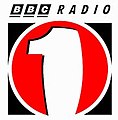BBC Radio 1
BBC Radio 1 is a British national radio station owned and operated by the BBC. It specialises in modern popular music and current chart hits throughout the day. The station provides alternative genres at night, including electronica, dance, hip hop and indie, while its sister station 1Xtra plays black contemporary music, including hip hop and R&B. Radio 1 also runs two online streams, Radio 1 Dance, dedicated to dance music, and Radio 1 Relax, dedicated to chill-out music; both are available to listen only on BBC Sounds.
For other stations known as Radio 1, see Radio 1.United Kingdom and internationally via BBC Sounds
- FM: 97.1 MHz–99.7 MHz
- DAB: 12B (BBC National DAB)
- Freesat: 700
- Freeview: 700
- Sky (UK only): 0101
- Virgin Media: 901
- Virgin Media Ireland: 907
- Astra 2E (28.2°E)
- Intelsat 901 (18°W)
Radio 1
English
Contemporary hit radio, with specialist programming at night
30 September 1967
- FM: 104.8 MHz (London)
- 96.0 MHz (Belfast)
- AM: 1053 kHz
- 1089 kHz
- 1215 kHz
Radio 1 broadcasts throughout the UK on FM between 97.1 MHz and 99.7 MHz, digital radio, digital TV and BBC Sounds. It was launched in 1967 to meet the demand for music generated by pirate radio stations, when the average age of the UK population was 27.[1] The BBC claims that it targets the 15–29 age group,[2] and the average age of its UK audience since 2009 is 30.[3] BBC Radio 1 started 24-hour broadcasting on 1 May 1991.[4]
According to RAJAR, the station broadcasts to a weekly audience of 7.3 million with a listening share of 4.5% as of December 2023.
Content[edit]
Music[edit]
Because of its youth-orientated nature, Radio 1 plays a broad mix of current and potential future hits, including independent/alternative, hip hop, rock, dance/electronica and pop. This made the station stand out from other top 40 stations, both in the UK and across the world. Since its progressive view on modern electronic music, the BBC Radio 1 is well-liked and known in the worldwide drum and bass community, frequently hosting producers and DJs like Hybrid Minds or Wilkinson.
Due to restrictions on the amount of commercial music that could be played on radio in the UK until 1988 (the "needle time" limitation) the station has recorded many live performances. Studio sessions (recordings of about four tracks made in a single day), also supplemented the live music content, many of them finding their way to commercially available LPs and CDs. The sessions recorded for John Peel's late night programme are particularly renowned. The station has continued to record live music with its Live Lounge feature and the Piano Sessions, which started in November 2014.[88]
The station also broadcasts documentaries and interviews. Although this type of programming arose from necessity it has given the station diversity. The needletime restrictions meant the station tended to have a higher level of speech by DJs. While the station is often criticised for "waffling" by presenters, an experimental "more music day" in 1988 was declared a failure after only a third of callers favoured it.
BBC Radio 1's Teen Awards
- Hammersmith Apollo (2008–2010)
- Wembley Arena (2011–2018)
- Television Centre, London (2019)
United Kingdom
BBC Radio 1
- BBC Switch Live
- Switch Live Awards (2009)
2009
- BBC Radio 1
- BBC Two (2008, 2018–2019)
- BBC One (2009)
- BBC Three (2010–2013)
- CBBC (2014–2016)
- BBC Red Button (2017)
Awards and nominations[edit]
International Dance Music Awards[edit]
Radio 1 has won the International Dance Music Awards' Best Radio Station every year from 2002 to 2020 with the exception of 2010.





